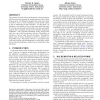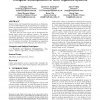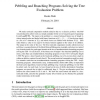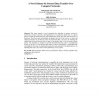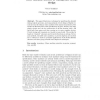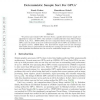CORR
2010
Springer
13 years 11 months ago
2010
Springer
Huffman coding is often presented as the optimal solution to Twenty Questions. However, a caveat is that Twenty Questions games always end with a reply of "Yes," whereas ...
CORR
2010
Springer
13 years 11 months ago
2010
Springer
In this paper, we propose a unified algorithmic framework for solving many known variants of MDS. Our algorithm is a simple iterative scheme with guaranteed convergence, and is mo...
CORR
2010
Springer
13 years 11 months ago
2010
Springer
The promise of search-driven development is that developers will save time and resources by reusing external code in their local projects. To efficiently integrate this code, user...
CORR
2010
Springer
13 years 11 months ago
2010
Springer
Regular chains and triangular decompositions are fundamental and well-developed tools for describing the complex solutions of polynomial systems. This paper proposes adaptations o...
CORR
2010
Springer
13 years 11 months ago
2010
Springer
The order bound for the minimum distance of algebraic geometry codes is defined for the dual of one-point codes. A new bound for the minimum distance of linear codes, and for codes...
CORR
2010
Springer
13 years 11 months ago
2010
Springer
We study restricted computation models related to the tree evaluation problem. The TEP was introduced in earlier work as a simple candidate for the (very) long term goal of separa...
CORR
2010
Springer
13 years 11 months ago
2010
Springer
It is frequently suggested that predictions made by game theory could be improved by considering computational restrictions when modeling agents. Under the supposition that player...
CORR
2010
Springer
13 years 11 months ago
2010
Springer
: This paper presents a novel encryption-less algorithm to enhance security in transmission of data in networks. The algorithm uses an intuitively simple idea of a `jigsaw puzzle&#...
CORR
2010
Springer
13 years 11 months ago
2010
Springer
This paper illustrates a technique for specifying the detailed timing, logical operation, and compositional circuit design of digital circuits in terms of ordinary state machines w...
CORR
2010
Springer
13 years 11 months ago
2010
Springer
We present and evaluate GPU Bucket Sort, a parallel deterministic sample sort algorithm for many-core GPUs. Our method is considerably faster than Thrust Merge (Satish et.al., Pro...


